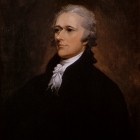
Автор
Лучшие книги Александра Гамильтона
- 5 произведений
- 11 изданий на 2 языках
По популярности
-
Федералист Александр Гамильтон, Джеймс Мэдисон, Джон Джей
ISBN: 5-7777-0061-6 Год издания: 2000 Издательство: Весь Мир Язык: Русский Сборник состоит из восьмидесяти пяти политических эссе, авторами которых являются отцы-основатели США. Первоначально печатались в 1787-1788 гг. в четырех газетах Нью-Йорка под псевдонимом Публий. Статьи появились в ходе острой полемики накануне ратификации штатом Нью-Йорк Конституции США, они защищают концепцию партии федералистов, сторонников сильной централизованной власти. Статьи считаются классикой американской политической мысли.
Второе издание русского перевода воспроизводит текст книги, вышедшей в 1993 г. в издательстве «Прогресс». -
The Revolutionary Writings of Alexander Hamilton Александр Гамильтон
Год издания: 2008 Издательство: Liberty Fund Alexander Hamilton, trusted military aide and secretary to General George Washington, wrote to persuade. He had the ability to clarify the complex issues of his time without oversimplifying them. From the basic core values established in his earlier writings to the more assertive vision of government in his mature work, we see how Hamilton’s thought responded to the emerging nation and how the nation was shaped by his ideas. This comprehensive collection of his early writings, from the period before and during the Revolutionary War, provides a fuller understanding of the development of his thinking. -
Writings Alexander Hamilton
ISBN: 1931082049, 978-1931082044 Год издания: 2001 Издательство: Library of America Язык: Английский Alexander Hamilton, the subject of Lin-Manuel Miranda's smash hit Broadway musical, comes to life in his own words in this critically acclaimed collection, which also includes conflicting eyewitness accounts of the duel with Aaron Burr that led to his death. One of the most vivid, influential, and controversial figures of the founding of America, Hamilton was an unusually prolific and vigorous writer. As a military aide to George Washington, critic of the Articles of Confederation, proponent of ratification of the Constitution, first Secretary of the Treasury, and leader of the Federalist Party, Hamilton devoted himself to the creation of a militarily and economically powerful American nation guided by a strong, energetic republican government. His public and private writings demonstrate the perceptive intelligence, confident advocacy, driving ambition, and profound concern for honor and reputation that contributed both to his astonishing rise to fame and to his tragic early death.
Arranged chronologically, this volume contains more than 170 letters, speeches, pamphlets, essays, reports, and memoranda written between 1769 and 1804. Included are all fifty-one of Hamilton’s contributions to The Federalist, as well as subsequent writings calling for a broad construction of federal power; his famous speech to the Constitutional Convention, which gave rise to accusations that he favored monarchy; and early writings supporting the Revolutionary cause and a stronger central government. His detailed reports as Secretary of the Treasury on the public credit, a national bank, and the encouragement of manufactures present a forward-looking vision of a country transformed by the power of financial markets, centralized banking, and industrial development.
Hamilton’s sometimes flawed political judgment is revealed in the “Reynolds Pamphlet,” in which he confessed to adultery in order to defend himself against accusations of corrupt conduct, as well as in his self-destructive pamphlet attack on John Adams during the 1800 presidential campaign. An extensive selection of private letters illuminates Hamilton’s complex relationship with George Washington, his deep affection for his wife and children, his mounting fears during the 1790s regarding the Jeffersonian opposition and the French Revolution, and his profound distrust of Aaron Burr.



